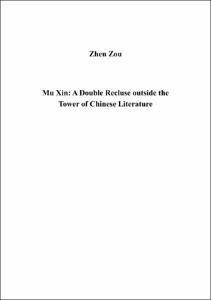Mu XinA Double Recluse outside the Tower of Chinese Literature

Mu Xin
A Double Recluse outside the Tower of Chinese Literature

| dc.contributor.advisor | Kubin, Wolfgang | |
| dc.contributor.author | Zou, Zhen | |
| dc.date.accessioned | 2020-04-19T16:57:03Z | |
| dc.date.available | 2020-04-19T16:57:03Z | |
| dc.date.issued | 08.10.2014 | |
| dc.identifier.uri | https://hdl.handle.net/20.500.11811/5994 | |
| dc.description.abstract | The Chinese culture sequentially underwent ancient cultural tradition between Pre-Qin and Qing dynasties, the May Fourth new cultural tradition, the cultural tradition of red regime in Yan’an, the tradition of the Cultural Revolution and the official discourse system in recent 30 years after 1978. Those five kinds of cultural tradition are not parallel. It is the process that the latter three traditions destroyed the former two, which results in the cultural ruptures in modern China. The rupture of the cultural traditions and the ineffectiveness of the cultural memories constitute the crisis and predicament of contemporary Chinese literary writing and reading. Mu Xin (1927-2011) is a man of letters, difficult to be classified, in the history of Chinese literature in the 20th century. Because his literature was not in the transmutation and a series of ruptures of the cultural tradition. If we compare Chinese Literature to a tower, then he is not inside the tower. He is the double recluse who strolls outside the tower of Chinese literature. The first significance of recluse for Mu Xin is his real life. The whole life of Mu Xin is the life to recall his past through literature, the life to be reclusive for literature, and the life to educate and perfect himself by means of literature. The second significance of recluse for Mu Xin is that his aesthetic stance and his writing style are so different from the literary discourse and the way of thinking of modern Chinese literature. Mu Xin’s world is wide. He was classified as a diasporic writer. It doesn’t only mean that he still wrote in Chinese after he migrated to New York in 1982, but also means that he had always held a kind of diasporic perspective. He considered that culture (literature) should be holistic and global, and opposed the binary opposition of the tradition and the modernity, of the West and the nation. As for Mu Xin, literature is an integrated world and his hometown in the sense of the inner realm of the conceptual. Therefore his writing can be regarded as a kind of self-diaspora in the worldwide literary homeland. As Professor Tongming Jun Liu considered, the significance of the style of Mu Xin is that Chinese literature acquired extremely rich worldwide connotation in his style. | en |
| dc.language.iso | eng | |
| dc.rights | In Copyright | |
| dc.rights.uri | http://rightsstatements.org/vocab/InC/1.0/ | |
| dc.subject | Mu Xin | |
| dc.subject | Doppel-Einsiedler | |
| dc.subject | Diaspora-Schriftsteller | |
| dc.subject | Geschichte der chinesischen Literatur | |
| dc.subject | Bruch der chinesischen kulturellen Traditionen | |
| dc.subject | double recluse | |
| dc.subject | diasporic writer | |
| dc.subject | history of Chinese literature | |
| dc.subject | rupture of Chinese cultural traditions | |
| dc.subject.ddc | 890 Literatur in anderen Sprachen | |
| dc.title | Mu Xin | |
| dc.title.alternative | A Double Recluse outside the Tower of Chinese Literature | |
| dc.type | Dissertation oder Habilitation | |
| dc.publisher.name | Universitäts- und Landesbibliothek Bonn | |
| dc.publisher.location | Bonn | |
| dc.rights.accessRights | openAccess | |
| dc.identifier.urn | https://nbn-resolving.org/urn:nbn:de:hbz:5-37735 | |
| ulbbn.pubtype | Erstveröffentlichung | |
| ulbbnediss.affiliation.name | Rheinische Friedrich-Wilhelms-Universität Bonn | |
| ulbbnediss.affiliation.location | Bonn | |
| ulbbnediss.thesis.level | Dissertation | |
| ulbbnediss.dissID | 3773 | |
| ulbbnediss.date.accepted | 19.08.2014 | |
| ulbbnediss.institute | Philosophische Fakultät : Institut für Orient- und Asienwissenschaften (IOA) | |
| ulbbnediss.fakultaet | Philosophische Fakultät | |
| dc.contributor.coReferee | Kauz, Ralph |
Files in this item
This item appears in the following Collection(s)
-
E-Dissertationen (713)




